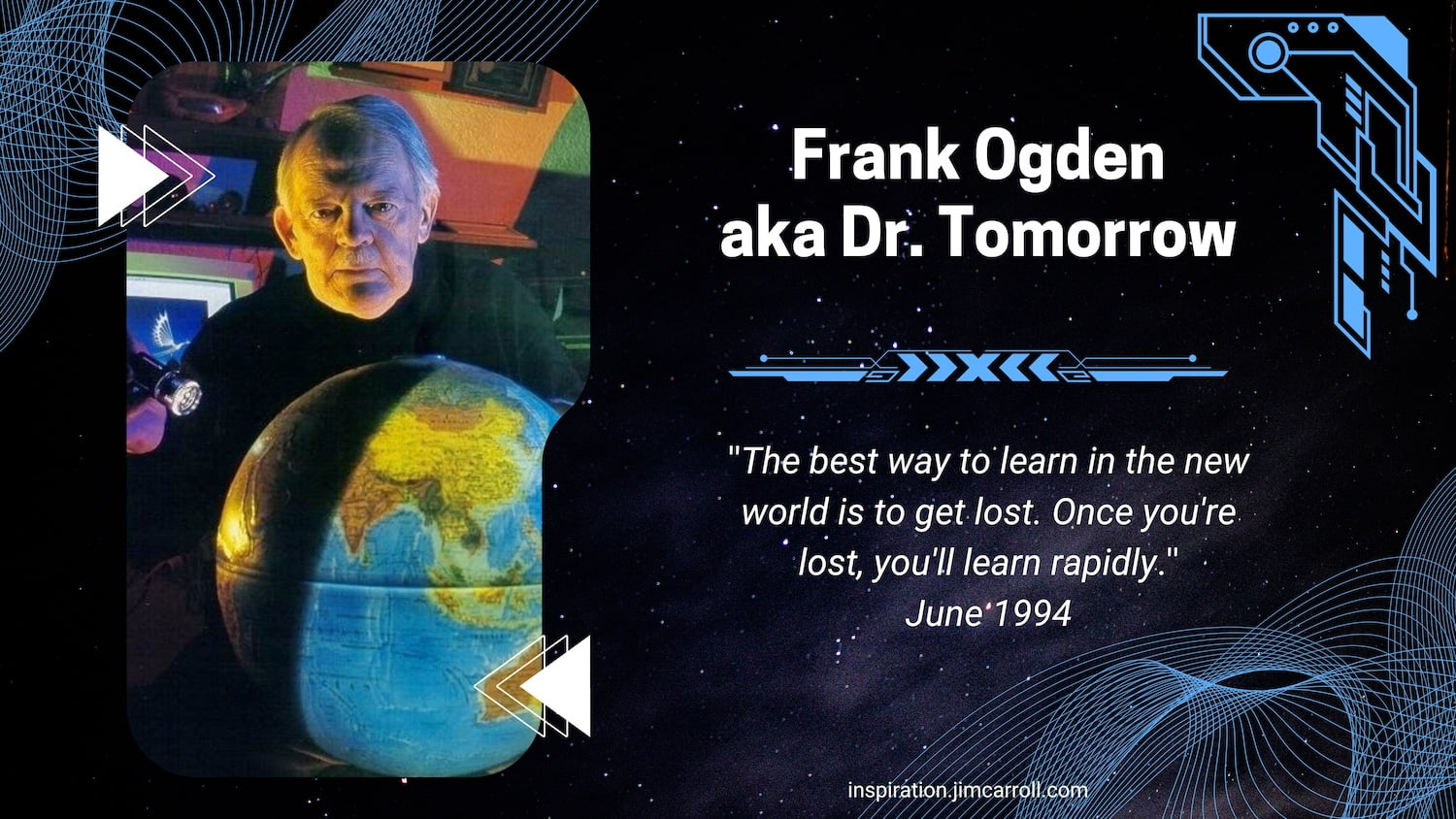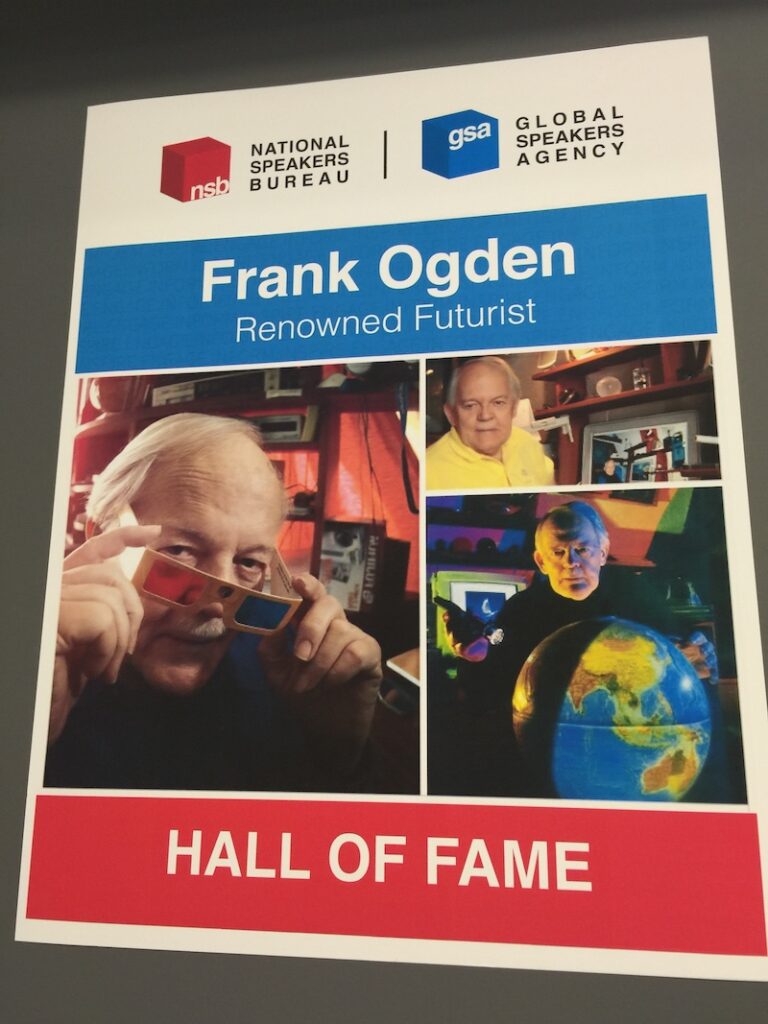“The best way to learn in the new world is to get lost. Once you’re lost, you’ll learn rapidly.” – Dr. Tomorrow, 1994

People often ask how I became a futurist.
It’s simple. Dr. Tomorrow was retiring – or slowing down as were – and I made the decision to follow in his footsteps, after having had a speaking career revolved around the Internet, technology, connectivity, and other fast-moving trends. Since so much of what I was talking about involved the same type of things he was focused on, I decided that I was a futurist as well, prepared to step into his shoes.
Dr. Tomorrow – real name, Frank Ogden – was a colorful well-known Canadian futurist who spent his time exploring the future of the world all around him. He was a pretty eccentric fellow, to say the least!
Frank Ogden has been living on a houseboat in Vancouver harbor and monitoring satellite transmissions for 18 years. At 74, the man, who modestly calls himself Dr. Tomorrow, is no couch potato. He can identify global trends amid the welter of individual visual incidents.
‘‘Chaos, panic and rapid change” are the three horsepersons of the apocalypse forecast by Ogden, who roams the world giving 70 speeches a year, investigating new products and researching high-tech breakthroughs. ”There’s a bulldozer of change sweeping over the land, and those who don’t change are going to be flattened,” he said in Toronto this week.
More countries – including Canada, the U.S. and Britain – will break up into smaller, constituent parts just like the former Soviet Union, because the continuing speed up in communications will cause community disintegration and national fragmentation. In Africa alone, there have been 50 new countries created in the past 30 years. The world will see as many new countries this decade, he says.
From the potential political bleakness, however, futurist Ogden plucks hope for business. ”There are no paths, no trails, no price lists, but there’s more opportunity today than there has ever been in history.”
Innovators will survive and prosper because 90% of the products that will be used 10 years from now don’t even exist today, claims Ogden. In the race toward the new economy, however, some businesses and nations have adapted better than others. In 1993, one company, Sony, introduced more new products in a year – at the rate of five items each day – than did all of Canada.
Dr. Tomorrow gives a diagnosis of chaos
4 June 1994, The Financial Post
He and I shared many an agenda at conferences through the 90s, and he had a fascinating way of presenting the ideas of tomorrow. As the Internet emerged, I took care to register the domain DrTomorrow.com on his behalf, so that he could become an active part of the world in which he was already participating. He too was focused on the ‘era of acceleration,’ a world of incessant, faster change. You couldn’t go to a conference in Canada in the 90s and early 2000s and not see him on stage.
He and I shared the same speaker bureau for many a year – Canada’s National Speaker Bureau – and today, they pay homage to his role over that time.
Dr Tomorrow died in 2012, and many a tribute flowed in:
He went by many names. Some proclaimed him the “Marco Polo of Cyberspace.” Others, “Dr. Tomorrow” from his internationally syndicated newspaper column that appeared throughout North America. Whatever name you gave him, it was generally agreed that Frank Ogden, who died at the age of 92 a few days before the New Year arrived in 2012, was one of Canada’s rare creatures – an iconoclast who lived outside the norms of his time. He was not only an elected fellow of the Explorer’s Club; he was also the first Canadian member of the World Future Club. From studying voodoo in Haiti, to turning himself into a “cyborg” by having surgically implanted, intra-ocular bionic lenses to improve his eyesight, Ogden was never chained by conventions. In a country not noted for celebrating its prodigies, Ogden created a niche that left both scientists and scholars comparing him to such unconventionally brilliant thinkers as Marshall McLuhan and Buckminster Fuller.
Living Outside the Norms of Time: Remembering Frank Ogden (‘Dr. Tomorrow’)
Frank Ogden , the free-spirited futurist known as Dr. Tomorrow who was one of the first people to predict that Internet would come to dominate our lives, has died.
The world-renowned Vancouverite with an eclectic resume, including pilot, corporate consultant, broadcaster, LSD therapist, teacher and author of 22 books, died on Dec. 29.
He was 92. A close friend of science fiction writer Arthur C. Clarke, a fellow futurist , Ogden predicted a future of teleports, limited labour unions, the growth of self-employment, and body implants that would turn people into cyborgs.
He travelled widely throughout his long life, giving lectures on all things high-tech and experimenting with different cultures, including studying voodoo in Haiti.
The nonconformist felt just at home on the neon-lit streets of Tokyo or the Sahara desert as he did in Vancouver. When he wasn’t roaming the planet, Ogden worked from home on his wired houseboat in Vancouver’s Coal Harbour, and was a pioneer in streaming live video Internet broadcasts.
From his floating electronic cottage, Ogden conducted the first two international seminars via satellite and fibre- optic technology, for Australia’s Telstra Communications Network in Sydney and Melbourne.
Years before he started using the Internet to stream live video, Ogden predicted that the broadcast universe wouldn’t be limited to 500 traditional channels, but would instead be a universe frequented by anyone with a camera, computer and limited money.
It was one of his many prognostications that he lived to see become a reality.
B.C. futurist a free spirit
Vancouver Sun, 14 January 2013
Dr. Tomorrow, through his insight, encouraged people to align tomorrow, and as I found myself doing the same thing – and taking on an increasing number of bookings in which he could not participate, I too was doing the same thing.
And that’s how I became a futurist!





GET IN TOUCH
Jim's Facebook page
You'll find Jim's latest videos on Youtube
Mastodon. What's on Jim's mind? Check his feed!
LinkedIn - reach out to Jim for a professional connection!
Flickr! Get inspired! A massive archive of all of Jim's daily inspirational quotes!
Instagram - the home for Jim's motivational mind!